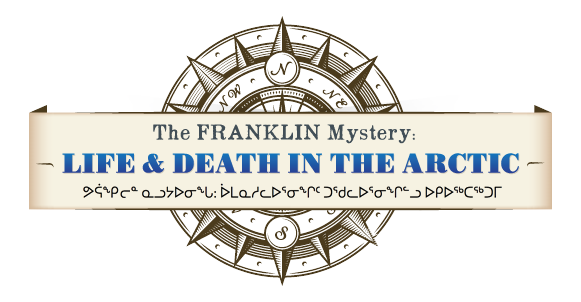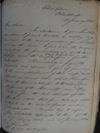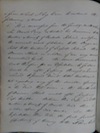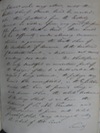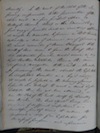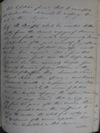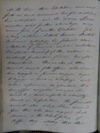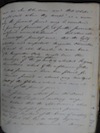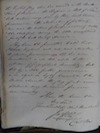Sir John Ross Opinion to Lord Haddington [Regarding the Arctic Expedition] (1845)
Ellis Place
Blackheath
25 January 1845
My Lord,
In obedience to your Lordship's directions I proceed to state in writing my answers to the several questions your Lordship did me the honour to put to me this morning, respecting the practicability of a North West Passage and the benefits likely to result from a further attempt - I have already so frequently recorded my opinion in favor of proceeding to the accomplishment of that important object in several letters which I have from time to time addressed to the Lord Commissioners of the Admiralty since my return from the last attempt of the kind in 1833 that for a detailed statement on the several points under consideration. I would beg to refer your Lordships especially to those of the 6th of February 1838 and 22nd January 1836 from which I beg leave to submit the following extracts.
1. It is merciful from the facility into which Sir Edward Parry extended his discoveries to the western extremity of Melville Island, and from the annual visits of Whalers to the Bays and Inlets to the Westward of Leopold Island, that Barrows Strait is seldom if ever very much encumbered by Ice. The most desirable route therefore for an Expedition to follow would, after passing through Lancaster Sound, to proceed direct to the Westward, not regarding any of the smaller openings in the land that occur in the north Shore of Barrows Strait until after passing Cape Walker. Between the Cape and the eastern extremity of Bank's Land there is a clear open space of 300 miles. Let the expedition then take the first favorable opportunity of turning to the SW or Whereas Islands & Ice may allow, until the Eastern shore of Banks' Land be reached: when, thus protected from the Easterly Current as well as from any great pressure of ice from the North-West there would be no difficulty under ordinary circumstances in gaining the north shore of the continent of America to the westward of Wollaston Land, a distance not much exceeding 200 miles. This strait has the only doubtful or uncertain part of the voyage if there be a doubt at all on the subject, being attained, the passage may be hard to be accomplished, as the Expedition would then have to proceed along a well known shore, the whole distance to Behring Straits & we have the testimony of Sir John Franklin and Dr. Richardson to prove with what facility ships may navigate along the whole of that coast.
Secondly – In the event of the state of the ice proving unfavourable to the prosecution of the above route, a fair prospect appears by Wellington Channel, which on Edward Parrys first voyage presented such an inviting appearance it might be desirable to proceed in that direction, especially as men of science and opinion the recent researches of Baron Wrangel to the north of Asia seem to favor the belief that less obstruction from ice would occur in very high Northern Latitudes, than in the more confined navigation to the south – Besides by pursuing this route, should the Expedition be compelled to winter in a high Latitude it might be possible in the ensuing spring before the Ice breakup to reach a much higher Latitude than has yet been attained, or even the Pole of the Earth itself by traveling over the Ice. This last object having been considered of sufficient importance in a scientific point of view to induce the equipment in 1827 of an expedition for the express purpose and experience of that Expedition proved, that to accomplish that desideratum it would be necessary to winter in these regions.
Thirdly the Benefits which has resulted to this country from the several voyages of Discovery thus sent forth is indeed not generally known independent of the great amount of geographical knowledge and important scientific results that have been acquired, it is a fact that for several years past more than half a million of produce has been annually brought from the recently discovered fishing stations on the West Coast of Baffin Bay, Lancaster Sound and Regent Inlet-: thus opening a new source of national wealth and employment to our ships and seamen, and by the increase of duties more than doubly repaying the expenses incurred. Indeed it may be said that in any one of the first ten years after their discovery, these fisheries yielded more than sufficient to repay the nation the whole of its outlay in the equipment of the various Expeditions that have been despatched in that service.
At the time those Expeditions were sent forth no such communal benefits could have been anticipated : and thus it may be uncertain what further advantages may arrive from another Expedition. Yet in every instance hitherto known British Communal enterprise has followed close in the wake of British Naval Discovery and we well know that extended knowledge of this nature is eventually productive of later benefits to mankind. There are also at this moment several of the officers who have been engaged in previous voyages eager to engage in such an enterprise and whose experience, so important to a successful navigation amongst ice would be a most important advantage to such an Expedition. The favourable accounts also which I have received from those who were engaged last summer in the whale fishery of Baffin Bay, stating "that there was no ice to be seen and that ships might sail to where they would" is a reason why the present period may be considered as presently favourable for to further prosecution and final accomplishment. But above all in a scientific point of view that the highly interesting and important magnetic observations they would be able to make so near to one of the Magnetic Poles might have the advantage of the co-operation of extended magnetic observations which by the influence of the British Government have been placed for a limited period on almost any civilised part of the globe which will cease at the end of the present year.
The following extract from Mr. Baer's memoir to the Imperial Academy may indeed show that the apprehensions, which have been expressed of some time proven depriving England of the honour of completing that which she has so nobly begun and by no means demurred - He says "The English Flag alone here waved in the North Shores of America; the Russian on that of Siberia, both nations may win by their hardwork & perseverance, the admiration of posterity, even now the nations of Europe anxiously watch who shall find during the still unexplored part of the North Coast of America["] –
I beg now to be permitted to add that that England must not now abandon the glorious pre-eminence she has ever maintained in all that relates to the extension of geographical Beaufort Sea -: but that by a still further perseverance in an object so highly desirable to the British character the glory of this accomplishment may be reserved for our own country.
I have the honour to be
My Lord
Your Lordship's Obede humble servant
John Ross Capt. R.N.

